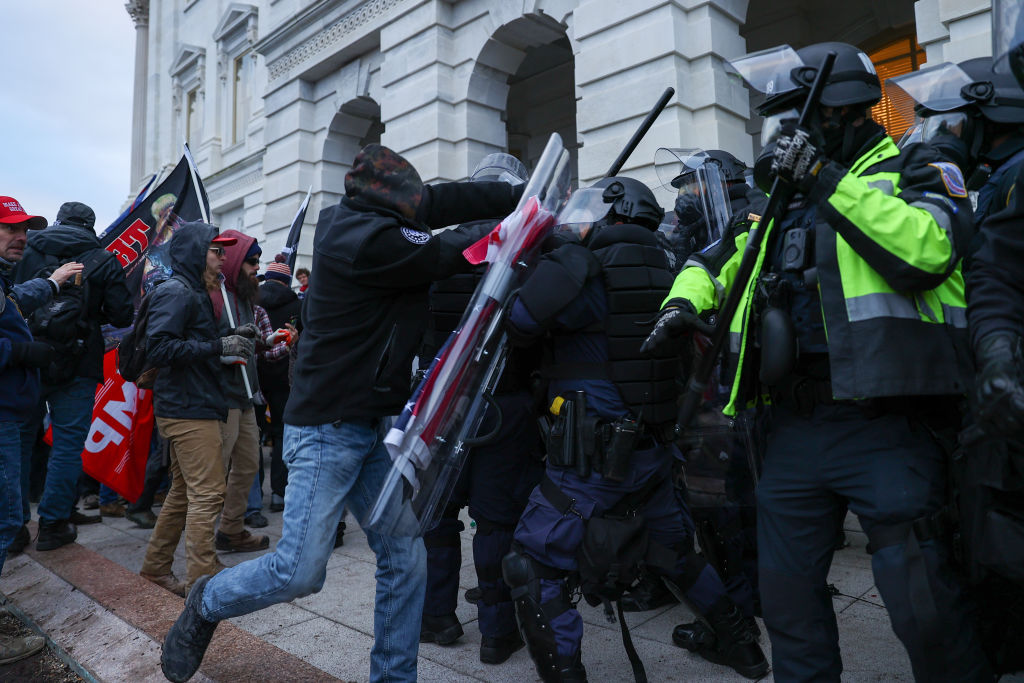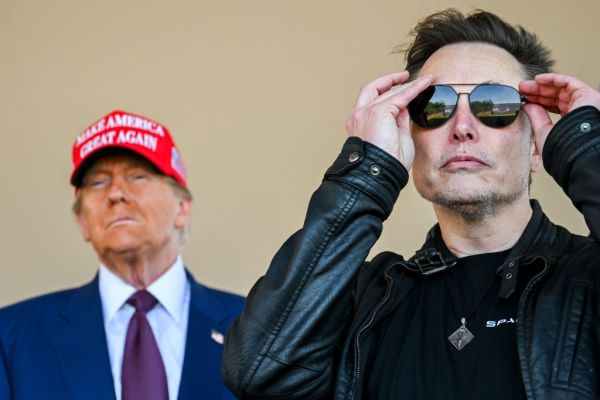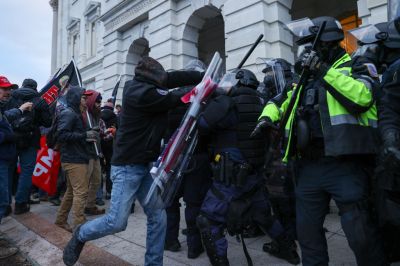Last year President Joe Biden accused Donald Trump of leading an “extremist movement that does not share the basic beliefs in our democracy.” Vice President Kamala Harris put a finer point on it last month. Donald Trump, she said, was a fascist.
It’s commonplace, of course, for Democrats to call Republicans fascists; they’ve been doing so since at least the 1960s. The difference this time is that fellow Republicans and Trump’s own former chief of staff agree. Trump unmistakably talks like a fascist, which is why people have been warning about imminent fascism for years. He admires dictators, praises violence, bullies the media, exudes machismo, demonizes opposition, preaches belligerent nationalism, and encourages total, personal loyalty to himself.
Trump’s rhetorical fascism has been clear for years, which is why, nine years ago, when Trump was running for president the first time, I (along with many others) accused him of being a fascist, based on his Muslim ban, admiration for autocrats, praise of violence, and calls to crack down on press freedom.
But does he do anything fascist? Does he match words with action? In 2018 I queried the claim again, this time by looking at the first 18 months of Trump’s administration and comparing his words and deeds to the Nazis in the 1930s. “You have to be paranoid and devoid of all historical perspective to believe that Trump’s America is full-blown fascist right now in 2018,” I concluded. “But you also have to be singularly insensitive and devoid of all historical perspective to be untroubled about the trend lines in American political culture.”
The trend lines that worried me: “We do have an unseemly personality cult, a clear shift in the culture of discourse about race, and a blurring of the lines between religion and nationalism. These trends are truly troubling.”
Now we have a full Trump term and a second and third presidential campaign behind us. Trump has been much clearer about what he wants to do and he has more experience in getting it done. As Trump has rolled out his Cabinet nominees and other high-level appointees, his full legacy is coming into focus. What’s the fascism scorecard as we approach 2025?
“Trump has repeatedly promised to embark on a campaign of retribution against his political enemies, suggesting he may use the Internal Revenue Service and Department of Justice to investigate and prosecute them.”
There are a few things we can expect from Trump that are neither fascist nor authoritarian, despite what the left will inevitably say about them: conservative judges, pro-life legislation, and bellicose rhetoric on the world stage. Trump is likely to pursue some or all of these things and none of them are remotely anti-democratic, authoritarian, or fascist. They might be wise or foolish, and the left will hate them all, but calling them fascist will only cheapen the word and desensitize the public to its use.
Authoritarian-adjacent.
But not everything Trump has said or will do can be dismissed as old-fashioned conservatism expressed via mean tweets. And for those matters, what might be most helpful is to draw a distinction between generic authoritarianism and bespoke American fascism, complete with a fetish for violence, hierarchy, purity, and leader-worship. Some things are run-of-the-mill authoritarian (still bad, but not goose-stepping fascist), while others are clear, dispositive signs that a distinctive American-style fascism has arrived.
There are some things Trump has talked about doing that might be authoritarian, or might not, depending on circumstance and intent, including: reinstating Schedule F, regulating social media companies, pursuing an agenda of economic populism, border enforcement and deportations, and invoking the Insurrection Act.
Schedule F, which Trump originally introduced in 2020 before Biden revoked it, converts civil service positions into politically appointed positions, giving the president more power over the executive branch. More executive branch cohesion isn’t necessarily authoritarian. I tend to think the presidency needs more control over the executive branch—coupled with far more checks and balances from the other two branches. The problem is what Trump might do with a more responsive executive branch, especially when unchecked from a subservient and supine Republican Congress.
Regulating social media and pursuing economic populism are similarly in “it depends” territory. If “regulation” is just another word for pressuring social media companies to favor Trump’s speech and disfavor progressive speech, that’s definitely authoritarian. If economic populism becomes a vehicle of corruption and patronage for Trump and his cronies to get rich off the public purse, that’s classic authoritarianism. Enforcing a border isn’t authoritarian—it is, actually, what the law mandates—nor are deportations. But doing so with heedless disregard for migrants’ humanity (such as through the family separation policy) would be.
Most worryingly, Trump has suggested invoking the Insurrection Act to crack down on crime. The law was used in the past to put down riots and enforce integration; it has a legitimate use. But Trump has hinted that he will use the law against street crime, likely to embarrass Democratic mayors and governors. Again, the devil is in the details: Authoritarianism would not be in the act itself, but in its intent, timing, target, and effects.
Authoritarian but not full-on fascist.
Then there are things that would definitely be authoritarian—though not necessarily specifically fascist.
Politicizing and weaponizing the bureaucracy for partisan gain is classic authoritarianism. (One of the charges against President Richard Nixon was the abuse of power by misusing federal agencies for political gain.) Trump has repeatedly promised to embark on a campaign of retribution against his political enemies, suggesting he may use the Internal Revenue Service and Department of Justice to investigate and prosecute them. His nomination of Pam Bondi as attorney general and Kash Patel as FBI director seem a clear sign he intends to make his threats a reality. Bondi helped defend Trump in his first impeachment trial and spread election denialism in 2020. Patel, in addition to promoting election denialism, has called for retribution against those who helped Biden “rig” the election. He even wrote a series of children’s books about Trump’s heroic battle against his enemies.
Trump may try to purge the bureaucracy and military leadership to ensure only those personally loyal to him are in positions of power. It’s normal for presidents to hire and fire their inner circle based on loyalty, but Trump seems to want to expand that to the entire federal workforce and the military. Trump’s nomination of Pete Hegseth to be secretary of defense, again, seems to indicate his intent to clean house at the Pentagon—though Sen. Marco Rubio seems less likely to follow suit at the State Department.
“Trump has repeatedly promised to embark on a campaign of retribution against his political enemies, suggesting he may use the Internal Revenue Service and Department of Justice to investigate and prosecute them.”
Trump may use the Insurrection Act—or normal police tactics—against peaceful protesters, not simply against rioters. The incident at Lafayette Square in June 2020 is a possible precedent (though it seems interagency bickering and bureaucratic incompetence played a role in that). Trump repeatedly suggested in the past that he wanted to revise laws about libel and defamation to make it easier to sue the media. Constraining free speech is, again, classic authoritarianism.
Trump has suggested, hinted, or joked about doing all these things. His supporters tell us to take him seriously, not literally, and Trump regularly deflects criticism by insisting that he is joking. Watching to see if Trump turns these jokes into policy will be a key indicator telling us how seriously to take him.
American fascism?
One challenge in describing things as specifically fascist is that, famously, there isn’t a consensus definition of fascism. The ways in which Trumps seems most clearly to approach fascism have more to do with style, rhetoric, and attitude than with governance.
Trump referred to his political opponents as “vermin,” accused immigrants of “poisoning the blood of our country,” and warned about the danger from the “enemy from within.” He regularly speaks in a way that is—to put it charitably—racially insensitive. He scapegoats an out-group (immigrants) to blame them for crime, violence, and economic woes. He plays on a strong us-versus-them hostility to keep the base energized. The level of personal devotion and personal loyalty he demands and receives is, to outside observers, creepy and weird.
Calling Trump’s rhetoric and posturing “fascist” isn’t a particularly hard call. Read a few speeches from Mussolini and you’ll hear the obvious parallels, which is why intellectuals who read history are the most alarmed about Trump. There isn’t (or shouldn’t be) much serious debate on this point: Trump’s rhetoric and symbolic behavior are demonstrably fascist.
Put it together and you see a movement that is performative fascism. Followers get the frisson and thrill of talking and posturing like fascists without the guilt of acting like them. Cocksure; punchy; spoiling for a fight; driven by nostalgia, fear, and anger; obsessed with internal enemies; preaching law and order; lustful for violence; defined by a single charismatic leader. … It is fascism as vibes, the fascism of mood and attitude, fascism as a lifestyle brand. It is fascist-chic. (Fascchic?)
January 6
The question remains: Will he do anything actually fascist?
We’re unlikely to see Congress create legal privileges for the dominant ethnic or religious group (conservative white Christians) and restrict the citizenship rights of everyone else. We’re unlikely to see Trump suspend the Constitution (even though he joked about doing so) to create a one-party state under his singular, personal rule. We’re unlikely to see Trump and the Congress legally proscribe opposition parties.
I think we’re even unlikely to see a surge of militarism (by which I don’t mean hawkish foreign policy, but a culture of regimentation, hierarchy, and obedience as a style for civilian life). Trump is too chaotic and incompetent to go for full-on militarism, and American political culture has too much latent libertarianism within it to tolerate it.
I do not say that to downplay or minimize Trump’s fascism. I think Trump will actually try to do one of the most clearly fascist things he’s suggested: Trump said he will pardon January 6 rioters. That, I believe, would be the signature move of a Trump administration intent on turning fascist vibes into fascist governance. Why would this be such a big deal?
Pardoning the J6ers would politicize the justice system, reward Trump’s most loyal followers for breaking the law, and signal that physical violence is acceptable when done in Trump’s cause. It would directly incentivize more violence and more law-breaking, and would signal to police and courts across the country that Trump’s supporters enjoy presumptive immunity for anything they may do in the course of advocating for Trump.
Without exaggeration, it would turn the most zealous MAGA supporters into Trump’s brownshirts.
It would validate the narrative that Trump and his followers have been the victims of a witch hunt and that they must get revenge to get justice. Pardoning the J6ers would supercharge all the most clearly fascist aspects of the MAGA movement. It would, in effect, make supporting Trump the new standard of lawfulness.
The president has access to a wide range of powers, many of which could be abused for illegitimate purposes. We tend to give most presidents the benefit of the doubt, trusting that Congress and the courts will step in if and when necessary.
Trump does not deserve the benefit of doubt. He deserves minute scrutiny. But Congress will not step in to check him, and the courts are doubtful given the recent ruling on presidential immunity. That means when Trump uses his legitimate powers in questionable ways, he is likely to get away with it. And the more he gets away with it, the more he will be encouraged to keep going.
That is what makes it so important to put his every act under the microscope, to examine its intent and its effects, to watch for the broader pattern, to see whether Trump’s administration is characterized more by conservative governance, by bumbling incompetence, or by fascist leanings. His pardoning of the J6ers will be one of the earliest indications.







Please note that we at The Dispatch hold ourselves, our work, and our commenters to a higher standard than other places on the internet. We welcome comments that foster genuine debate or discussion—including comments critical of us or our work—but responses that include ad hominem attacks on fellow Dispatch members or are intended to stoke fear and anger may be moderated.
With your membership, you only have the ability to comment on The Morning Dispatch articles. Consider upgrading to join the conversation everywhere.